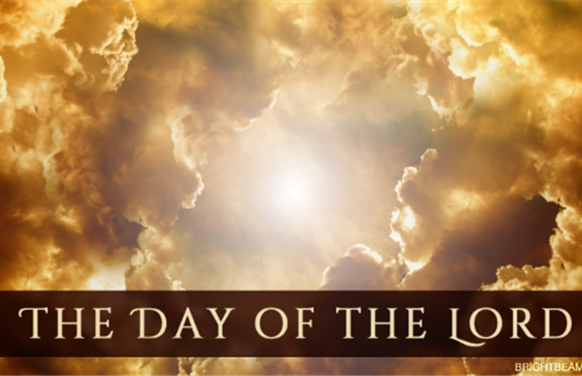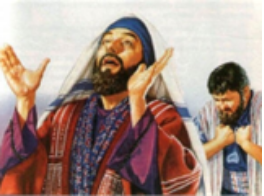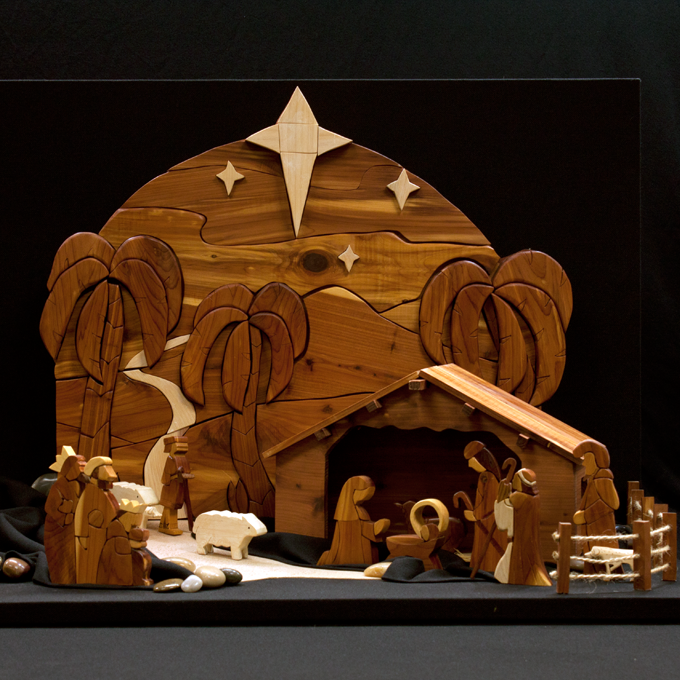An Introduction to the Sunday Scripture Readings - November 16, 2025
“By Your Perseverance You Will Secure Your Lives”
This is the next to the last Sunday in Ordinary Time before Advent begins. Today, our scripture readings direct our attention to the final judgement day, known as the “Day of the Lord”. There are questions that have pestered humanity since the earliest times—When will the end come? How will we be judged? What do we do while we wait?
judgement day, known as the “Day of the Lord”. There are questions that have pestered humanity since the earliest times—When will the end come? How will we be judged? What do we do while we wait?
In our first reading (Malachi 3:19-20), God offers a stern warning to those of Judah, both leaders and people alike, who have turned away from God and God’s law. For them, the day of judgement will be a horrible day, but those who love the Lord and fear His name will bask in the healing rays of the sun of justice.
In our Epistle reading (2 Thessalonians 3:7-12), St. Paul admonished the beloved in Thessalonica to model themselves after the work ethic he and his companions exhibited when they lived among them. Apparently, some of them thought Jesus’ second coming was so imminent that they stopped working for a living and became disorderly busybodies.
In our Gospel reading (Luke 21:5-19), Jesus described for His disciples what the end-times would look like and what things must happen before that day would come. He then described for them that “before all this happens”, they would endure many persecutions and trials for His name’s sake. But—despite all that, despite even being put to death, “not a hair on your head will be destroyed”.
Yes, the “Day of the Lord” will come and yet we know “neither the day nor the hour” (Matthew 25:13). What today’s scripture readings help us focus on is how we should live our lives in these “in-between times” - the time between Christ’s first coming and His second. That is the only thing we can control. Following St. Paul’s example to the Thessalonians in today’s Epistle would be a good place to start. Being Paul to others would be an even better way. May we imitate St. Paul’s life and courageous example to those who come into our lives.
https://bible.usccb.org/bible/readings/111625.cfm
An Introduction to the Sunday Scripture Readings - November 9, 2025
“You Are God’s Building”
The Feast of St. John Lateran Basilica is unusual in the Church’s calendar because it is a feast for a building rather than a saint or an event. The Basilica of St. John is dedicated to both St. John the Baptist and St. John the Evangelist. Pope’s cathedral. While this feast is for a building, the purpose is to help us reflect on the true Church, the Body of Christ—we the faithful who believe in Jesus, the Christ.
Our first reading is from the Book of the Prophet Ezekiel Ezek 47:1-2, 8-9, 12). Ezekiel wrote at a time when the temple in Jerusalem had been destroyed and the people exiled to Babylon. His intent was to give them hope of a future time when God would build a new temple in a new Jerusalem. Ezekiel’s vision saw a new temple with a river of life flowing from it that would bring new life to all the land. This river was similar to the river of the Garden of Eden. As the River of Life flowed from the original Eden, it brought life to all the land and watered the whole earth.
In our Epistle reading (1 Corinthians 3:9-11, 16-17), St. Paul tells us that we are the true Church and the Holy Spirit dwells within us. “You are God’s building”, and Jesus is our foundation. Paul writes, “Do you not know that you are the temple of God and that the Spirit of God dwells in you?” This indwelling of the Holy Spirit is what inhabits each one of us and makes us holy.
In our Gospel reading (John 2:13-22), we hear John’s account of Jesus cleansing the temple, overturning the tables of the money changers and telling the vendors to “Stop making my Father’s house a marketplace.” Here, Jesus was exercising His authority of the Son of David, who was given the responsibility for maintaining the “House of God.” When questioned for a sign of His authority, Jesus said, “Destroy this temple and in three days I will raise it up....But He was speaking about the temple of His body.”
Jesus identifies His body as the new Temple. Thus Ezekiel’s vision of a new Temple applies to Jesus’ body. The river that Ezekiel saw in his vision is the Holy Spirit, the giver of life. While we celebrate today the Cathedral in Rome and the chair of St. Peter, our readings tell us that the true temple is Jesus and the indwelling of the Holy Spirit joins each of us to God’s temple.
https://bible.usccb.org/bible/readings/110925.cfm
An Introduction to the Sunday Scripture Readings - November 2, 2025
“The Souls of the Just are in the Hand of God”
This Sunday is a rare opportunity to celebrate All Souls Day on a Sunday. Normally this would be the Thirty-First Sunday in Ordinary Time but because All Souls Day falls on a Sunday, we use these readings in our celebration. Our readings for this commemoration give us consolation for our beloved dead and hope of their resurrection and eternal life.
In our first reading from the Wisdom of Solomon (Solomon 3:1-9), we hear the firm belief in the afterlife and that the just will rest with our God for eternity. “They seemed, in the view of the foolish, to be dead … but they are in peace.” Whatever suffering they had in this life was seen as a testing and purification by God so that they would be found worthy. “… Because God tried them and found them worthy of himself.”
In our Epistle reading (Romans 6:3-9), St. Paul teaches us the importance of Baptism. Paul emphasizes that Baptism is a real and not merely symbolic participation in the death, burial, and resurrection of Christ. Paul writes, “If, then, we have died with Christ, we believe that we shall also live with Him.” This is not a symbolic resurrection, but a real resurrection to a real eternal life with Christ in paradise, heaven. We are called to believe this reality and put it into practice in our daily lives.
In our Gospel reading (John 6:37-40), we hear an excerpt from Jesus’ “Bread of Life Discourse” which happens immediately after He fed the five thousand with only five fish and two loaves of bread. This passage offers comfort and consolation that both we and our loved ones are the personal concern of Jesus. “Everything that the Father gives me will come to me, and I will not reject anyone who comes to me…”
Today’s celebration is not a feast day or a solemnity but always follows the Solemnity of All Saints on November 1, which is usually a Holy Day of Obligation. All Souls' Day is a solemn observance in the Catholic tradition to pray for the souls of the departed, particularly those in purgatory, who are believed to be in the process of purification before entering heaven. It is a day of remembrance and hope, reflecting on the unity of the Church, both on earth and in heaven, offering prayers and sacrifices to assist the souls of the deceased in their journey towards God's presence, and the promise of resurrection and eternal life with our God.
https://bible.usccb.org/bible/readings/110225.cfm
An Introduction to Sunday's Scripture Readings - October 26, 2025
“O Lord, Be Merciful To Me, A Sinner”
For the third Sunday in a row, our readings focus on prayer. Two Sundays ago, we focused on prayers of praise and thanksgiving. Last Sunday's readings focused on the need for trust and persistence in prayer. This Sunday, the focus is on coming to God with a humble and contrite heart. God listens especially to the poor, the oppressed and the humble sinner asking for mercy.
readings focused on the need for trust and persistence in prayer. This Sunday, the focus is on coming to God with a humble and contrite heart. God listens especially to the poor, the oppressed and the humble sinner asking for mercy.
In our first reading (Sirach 35:12-14, 16-18), we hear that God is an equal opportunity giver of mercy. “Though not unduly partial toward the weak, yet He hears the cry of the oppressed.” God has particular concern for the lowly and sufferers of injustice. God is ever the just judge, attentive to those in need of His mercy and to those who “serve God willingly.”
In our Epistle reading (2 Timothy 4:6-8. 16-18), St. Paul continues his letter from prison to his protégé Timothy, as he contemplates his impending execution and martyrdom. At its heart, it is a prayer of praise and glory to God for allowing Paul the gift of his ministry to the Gentiles in total service to God. Even though his friends deserted him, his trust in God is what sustained him. Paul wrote, “The Lord will rescue me from every evil threat and will bring me safe to His heavenly kingdom.”
In our Gospel reading (Luke 18:9-14), Jesus addressed this parable to those whose pride and conceit blinded them to God’s mercy. He contrasted a boastful Pharisee with a humble and contrite tax collector whose shame and remorse was painfully evident. The Pharisee, it seems, was praying more to himself than to God and seemed to take all the credit for his life of good works. The Pharisee boasted of his station in life while despising everyone else. And yet the tax collector simply begged for mercy and forgiveness.
The Pharisee in today’s Gospel did everything right; he followed every prescribed law, but his pride overshadowed and negated his good works. Pride is the opposite of “poor in spirit”; it isolates us from God’s mercy. If we were to emulate one ethic in today's readings, it might be the tax collector's humility and true repentance for his sins, not judging others or feeling in any way better than others. Like the poor widow and orphan in today’s first reading, we can simply take our sorrow and our troubles and lay them at the foot of the cross.
And then go and do justice to others.
https://bible.usccb.org/bible/readings/102625.cfm
An Introduction to Sunday's Scripture Readings - October 19, 2025
“Be Persistent, Whether It Be Convenient or Inconvenient”
It is said that prayer is communicating with God in a relationship of love and trust. Last Sunday, our readings talked about prayers of praise and thanksgiving — our response to God’s healing touch in our lives. This Sunday’s readings focus our attention on the prayers of petition for ourselves and others, and our persistence in praying to God. If even the dishonest judge would grant the persistent widow her request, how much more then, will our God of Love and Mercy respond to our prayers.
In our first reading (Exodus 17:8:13), we hear the story of the Israelites who were fighting a battle with Amalek after being attacked at Rephidim. Only when Moses’ arms are outstretched were the Israelites successful in battle. They prevailed in their battle only because of God's mercy at the prayers and persistence of Moses.
In our Epistle reading (2 Tim 3:14-4:2), St. Paul continues to instruct his protégé’ Timothy to remain faithful to what he had learned from the Scriptures and charged him to be persistent in his pastoral duties of proclaiming the Gospel. Paul reminds us that all Scripture is inspired by God and useful for teaching.
In our Gospel reading (Luke 18:1-8), Jesus instructed His followers on the importance of persistence in prayer and faithfulness. He told them the parable of the persistent widow, who wore down the dishonest judge with her persistence. Surely God, who loves us, would do no less.
At times, we can lose heart and give up too easily in our prayer and our religious devotion, expecting results in our time and manner instead of God's. Our ultimate prayer is for salvation, and in that we must always remain steadfast and hopeful, and trust in God’s plan. May God grant us not only persistence in prayer, but also patience and trust.
https://bible.usccb.org/bible/readings/101925.cfm
An Introduction to Sunday's Scripture Readings - December 25
“AND THE WORD BECAME FLESH AND DWELT AMONG US”
Our readings for Christmas Mass at night draw a direct connection between what Isaiah prophesied more than 500 years before Christ was born and what took place that Christmas night when the prophesy was fulfilled in all its humble glory.
years before Christ was born and what took place that Christmas night when the prophesy was fulfilled in all its humble glory.
In our first reading (Isaiah 9:1-6), we hear the prophesy of Isaiah that is proclaimed every Christmas Eve night - God's own Son will come to deliver us. "For a child is born to us, a son is given us; upon his shoulder dominion rests. They name him Wonder-Counselor, God-Hero, Father-Forever, Prince of Peace. His dominion is vast and forever peaceful, from David's throne, and over his kingdom, which he confirms and sustains by judgment and justice, both now and forever.”
In our Epistle (Titus 2:11-14), St. Paul leads us to remember that Christ promised to come again and will deliver us from all lawlessness. Paul teaches us how to live while we await the return of Jesus our Savior. “The grace of God has appeared, saving all and training us to reject godless ways and worldly desires and to live temperately, justly, and devoutly in this age, as we await the blessed hope, the appearance of the glory of our great God and savior Jesus Christ.”
Our Gospel reading (Luke 2:1-14) is the account of Jesus' humble birth as Joseph and Mary traveled to Bethlehem to register for the census of the house of David. The first to bear witness were the lowly shepherds from the surrounding hillsides.
The birth of the Jesus the Messiah was not just something that happened a long time ago. It was an event foretold for centuries and awaited fervently by the people of Israel. From the moment of Jesus' birth to his tragic death and triumphant resurrection, he was the embodiment of humility, patience, and love. It is how he calls us to live "temperately, justly and devoutly in this age as we await the blessed hope."
https://bible.usccb.org/bible/readings/122523-night.cfm
Click 'Read more' for the reflection on the Christmas Day readings.
